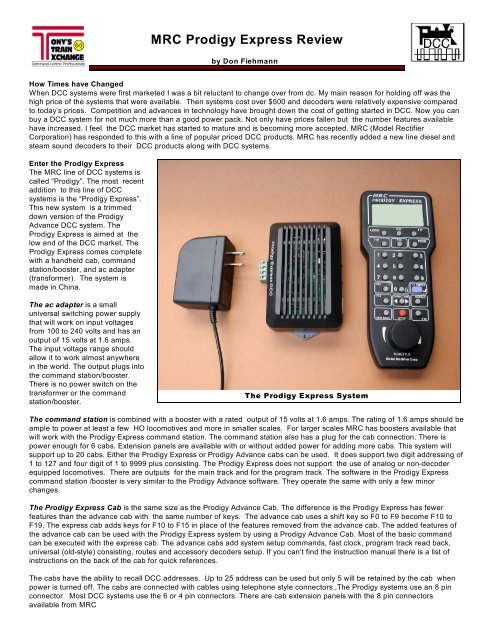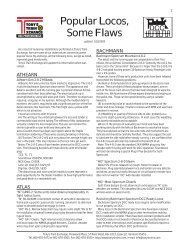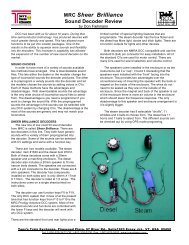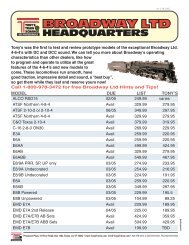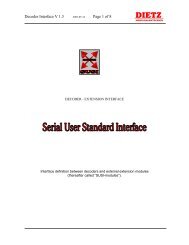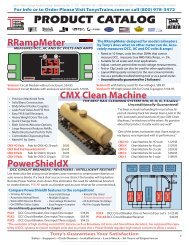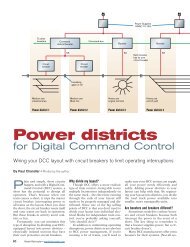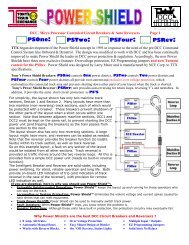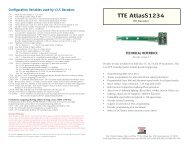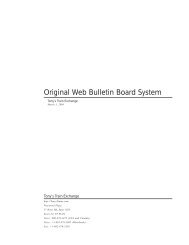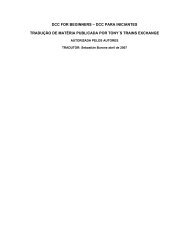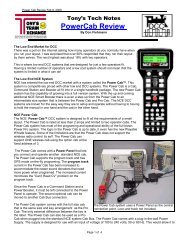MRC Prodigy Express Review - Tony's Train Exchange
MRC Prodigy Express Review - Tony's Train Exchange
MRC Prodigy Express Review - Tony's Train Exchange
Create successful ePaper yourself
Turn your PDF publications into a flip-book with our unique Google optimized e-Paper software.
<strong>MRC</strong> <strong>Prodigy</strong> <strong>Express</strong> <strong>Review</strong><br />
by Don Fiehmann<br />
How Times have Changed<br />
When DCC systems were first marketed I was a bit reluctant to change over from dc. My main reason for holding off was the<br />
high price of the systems that were available. Then systems cost over $500 and decoders were relatively expensive compared<br />
to today’s prices. Competition and advances in technology have brought down the cost of getting started in DCC. Now you can<br />
buy a DCC system for not much more than a good power pack. Not only have prices fallen but the number features available<br />
have increased. I feel the DCC market has started to mature and is becoming more accepted. <strong>MRC</strong> (Model Rectifier<br />
Corporation) has responded to this with a line of popular priced DCC products. <strong>MRC</strong> has recently added a new line diesel and<br />
steam sound decoders to their DCC products along with DCC systems.<br />
Enter the <strong>Prodigy</strong> <strong>Express</strong><br />
The <strong>MRC</strong> line of DCC systems is<br />
called “<strong>Prodigy</strong>”. The most recent<br />
addition to this line of DCC<br />
systems is the “<strong>Prodigy</strong> <strong>Express</strong>”.<br />
This new system is a trimmed<br />
down version of the <strong>Prodigy</strong><br />
Advance DCC system. The<br />
<strong>Prodigy</strong> <strong>Express</strong> is aimed at the<br />
low end of the DCC market. The<br />
<strong>Prodigy</strong> <strong>Express</strong> comes complete<br />
with a handheld cab, command<br />
station/booster, and ac adapter<br />
(transformer). The system is<br />
made in China.<br />
The ac adapter is a small<br />
universal switching power supply<br />
that will work on input voltages<br />
from 100 to 240 volts and has an<br />
output of 15 volts at 1.6 amps.<br />
The input voltage range should<br />
allow it to work almost anywhere<br />
in the world. The output plugs into<br />
the command station/booster.<br />
There is no power switch on the<br />
transformer or the command<br />
station/booster.<br />
The <strong>Prodigy</strong> <strong>Express</strong> System<br />
The command station is combined with a booster with a rated output of 15 volts at 1.6 amps. The rating of 1.6 amps should be<br />
ample to power at least a few HO locomotives and more in smaller scales. For larger scales <strong>MRC</strong> has boosters available that<br />
will work with the <strong>Prodigy</strong> <strong>Express</strong> command station. The command station also has a plug for the cab connection. There is<br />
power enough for 6 cabs. Extension panels are available with or without added power for adding more cabs. This system will<br />
support up to 20 cabs. Either the <strong>Prodigy</strong> <strong>Express</strong> or <strong>Prodigy</strong> Advance cabs can be used. It does support two digit addressing of<br />
1 to 127 and four digit of 1 to 9999 plus consisting. The <strong>Prodigy</strong> <strong>Express</strong> does not support the use of analog or non-decoder<br />
equipped locomotives. There are outputs for the main track and for the program track. The software in the <strong>Prodigy</strong> <strong>Express</strong><br />
command station /booster is very similar to the <strong>Prodigy</strong> Advance software. They operate the same with only a few minor<br />
changes.<br />
The <strong>Prodigy</strong> <strong>Express</strong> Cab is the same size as the <strong>Prodigy</strong> Advance Cab. The difference is the <strong>Prodigy</strong> <strong>Express</strong> has fewer<br />
features than the advance cab with the same number of keys. The advance cab uses a shift key so F0 to F9 become F10 to<br />
F19. The express cab adds keys for F10 to F15 in place of the features removed from the advance cab. The added features of<br />
the advance cab can be used with the <strong>Prodigy</strong> <strong>Express</strong> system by using a <strong>Prodigy</strong> Advance Cab. Most of the basic command<br />
can be executed with the express cab. The advance cabs add system setup commands, fast clock, program track read back,<br />
universal (old-style) consisting, routes and accessory decoders setup. If you can’t find the instruction manual there is a list of<br />
instructions on the back of the cab for quick references.<br />
The cabs have the ability to recall DCC addresses. Up to 25 address can be used but only 5 will be retained by the cab when<br />
power is turned off. The cabs are connected with cables using telephone style connectors.,The <strong>Prodigy</strong> systems use an 8 pin<br />
connector. Most DCC systems use the 6 or 4 pin connectors. There are cab extension panels with the 8 pin connectors<br />
available from <strong>MRC</strong>
.<br />
Testing<br />
To test the <strong>Prodigy</strong> <strong>Express</strong> I connected it to my HO layout. I<br />
started by running two QSI sound equipped engines , a<br />
standard Athearn F7 and a SoundTraxx LC decoder equipped<br />
locomotive. No problem with high startup current. I even<br />
consisted the four and ran them with no problems. All<br />
engines ran OK and all the functions controlled OK.<br />
The only problem is the F2 key is used for the horn or whistle<br />
and blows when pressed and stop when released. On one of<br />
the engines I had a strobe light programed for F2. The strobe<br />
would only work with the key pressed. I fixed it by mapping<br />
the strobe to operate on either F2 or F3. All of the other<br />
Function key toggle on and off for each time they are pressed.<br />
I ran a power test on the output using an RRamp Meter. With<br />
no current the voltage was 14.5 Volts. At 1 amp the voltage<br />
dropped to 13.6 volts. At 1.6 amps, the rated output, the<br />
voltage was 13.1. I ran the output at 1.64 amps for over 10<br />
minutes without a shutdown. At slightly higher current the<br />
output did shutdown. When the output was shorted and the<br />
short corrected the power came back on from the booster, but<br />
the cab display showed “SvdA”. To clear the display I had to<br />
<strong>Prodigy</strong> <strong>Express</strong> and <strong>Prodigy</strong> Advance Cabs. They look<br />
unplug the cab and plug it back in or turn the power off and<br />
the same but the Advance cab has more features.<br />
back on. There is no power switch so you either have to<br />
unplug the transformer or use a power strip with a switch. The<br />
<strong>Prodigy</strong> Advance system would return to normal after a short. Is this a bug or feature?<br />
You should avoid setting anything on the top of the command station as there are air vents on the top and blocking the air flow<br />
could cause it to overheat.<br />
I have a 2 by 4 foot N scale portable layout that I use for DCC demos and testing. This small layout has a loop of track and a few<br />
switches. Two of the switches have NCE Snap -Its for control of a track that cuts across the loop making a reversing section.<br />
There are three power districts using #912 automotive lamps for short circuit protection. The reverse loop uses the <strong>MRC</strong><br />
#AD520 reverse loop adapter. With the low power from the <strong>Prodigy</strong> <strong>Express</strong> the one amp 912 lamp would light on a short<br />
without shutting down the booster. Most of the electronic circuit breakers like the PowerShields trip at a higher current than the<br />
rating of the <strong>Prodigy</strong> <strong>Express</strong>. The same is true with many of the reversing loop adapters. The <strong>MRC</strong> #AD520 is rated at 2 amps<br />
and worked OK. Commonly used lamps for short circuit protection like the 1141 and 1156 both will draw too much current and<br />
trip the booster, but the 912 at one amp works OK.<br />
I have three DCC equipped N scale diesel locomotives that are used with the portable<br />
layout. I forgot the address of the Concor PA1. I used the program track and the<br />
read-back function of the <strong>Prodigy</strong> Advance cab to read the address There was no<br />
problem running the three. I got two running as a consist around the loop while<br />
switching with the third locomotive. To operate the two Snap-Its I to used the <strong>Prodigy</strong><br />
Advance cab.<br />
Conclusion<br />
The <strong>Prodigy</strong> <strong>Express</strong> is a low cost system best used for a small layout using with<br />
maybe one or two operators. Z to On3 locomotives can be powered from the booster.<br />
The <strong>Prodigy</strong> <strong>Express</strong> cab is more like an operators cab than a system cab like the<br />
<strong>Prodigy</strong> Advance cab. The <strong>Prodigy</strong> <strong>Express</strong> Cab can not address the standard<br />
accessory address range. The exception is the <strong>MRC</strong> #AD360 accessory decoder<br />
that uses mobile (locomotive) addresses 1 to 127. If you need to either control DCC<br />
switches or need the read-back capability adding a <strong>Prodigy</strong> Advance cab to the<br />
<strong>Prodigy</strong> <strong>Express</strong> system puts you close to the cost of the <strong>Prodigy</strong> Advance system.<br />
Plus the <strong>Prodigy</strong> Advance gives you higher power. It would be no surprise to see the<br />
<strong>Prodigy</strong> <strong>Express</strong> cab offered as a separate item that could be used to increase the<br />
Cab uses 8 pin phone type<br />
connections<br />
number of operators on either the Advance or <strong>Express</strong> system. Making cab cables may be a problem because the 8 pin<br />
connectors are not as available as the 4 and 6 pin connectors. The list price of the <strong>Prodigy</strong> <strong>Express</strong> system is $169.98.<br />
Check for discount prices at Tony’s <strong>Train</strong> <strong>Exchange</strong> Tel: 1-800-978-3472 OR 1-802-338-9136<br />
www.tonystrains.com<br />
Don Fiehmann 14Oct05


